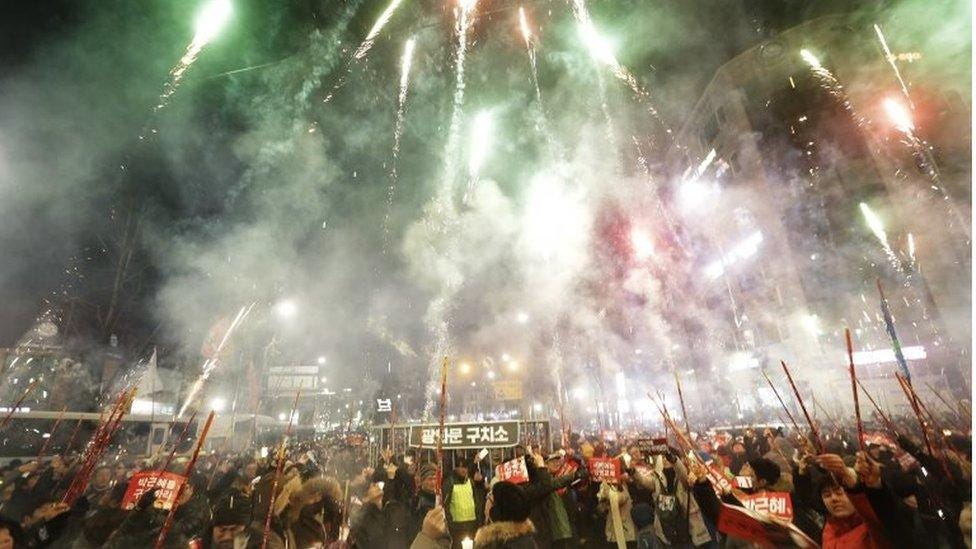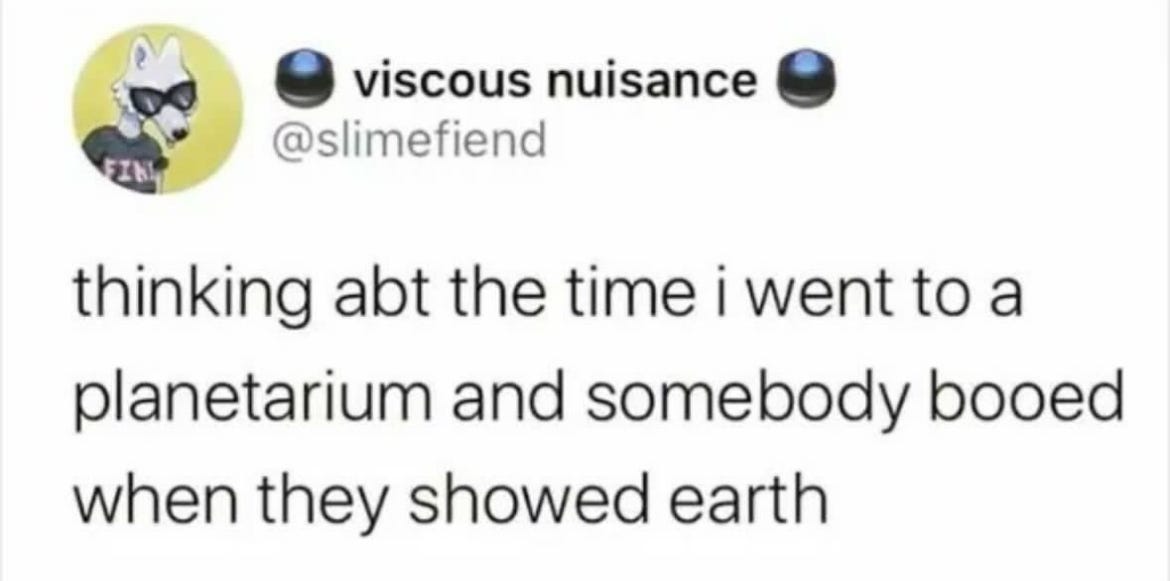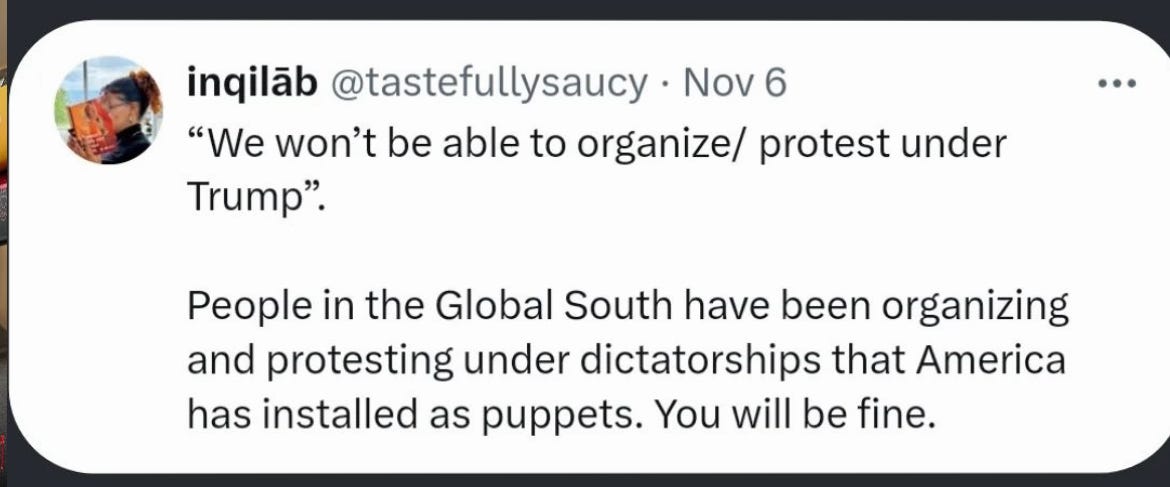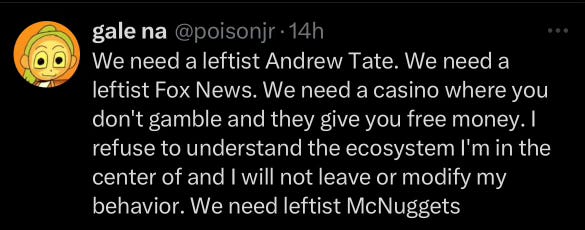Hello friends,
It’s been bright and droughty and generally too warm for November in New York. Earlier in the week the air smelled lightly burnt for days. There was a bunch of wildfire smoke wafting in from New Jersey; a brush fire in Prospect Park burned two acres. This is a pretty informal note about some of my thinking in the days after the election.
For those of us who were around for both, it’s pretty unanimous that this election result feels very different than its 2016 counterpart. The meaning of what has happened is fundamentally different, as are the calculations around what can be done. There’s a lot more steadiness and resignation from the people I know. Vibe readout: a lot of compartmentalization, getting on with life, quiet stress, some deep ambient freaking out, and generally and most of all business-as-usual. Last Wednesday I had close friends over for dinner; I also learned that the writer Dorothy Allison, who means a lot to me, passed away at 75. On Thursday I heard that one of my friends who I’d been out of touch with for several years had just killed himself and burst into tears at the shock and sadness of it, at learning this about someone whose life I had always seen as the opposite of lonely in every way. On Friday I sat in Herbert von King Park with a friend and his months-old baby, the three of us laughing and amiable in the sun, and I wondered at the unceasing whiplash of present life. I want to say to anyone who needs to hear it: please take care of yourself in the time to come.1
In the past week I’ve read a couple good post-election analyses—Gabriel Winant’s for Dissent and this essay on ambient information from Nathan Heller stood out—and some, especially on social media, that made me feel like my own literacy was a mistake.2 Anyway, disclosure up top: I’m not doing sophisticated horse-race post-morteming here, you can get that from people who are more about that life. I do want to say a few general things that are, on average, forward-looking.
affective politics aka notes on feeling
Something that’s been forgotten by a lot of people is that politics is won and lost over two things: how you impact people’s material circumstances, and how you make people feel.
And how you make people feel is about more than what you say. It’s about more than being right or laser-cutting some precise policy jigsaw. It’s something more electric and extraverbal; it’s a story and a judgment that a person makes about who they are, who you are, and what reality is.
There’s been a lot of hair-splitting in the last week appearing to look for one decisive factor that called the election: the role of Harris’ race and gender or inflation-incumbent bad luck or Dem dealignment with the working class or the role of Gaza and the US war machine. But looking at this as a system of on-off switches for a train seems to me to miss the point a little. The American electorate is vast, volatile, heterogenous, and unwieldy, but in rare moments it coalesces decisively along a moral narrative. It did the same in 2008. Last Tuesday, aided by our fraying and billionaire-bought mass communications fabric, a coalitional majority of people aligned themselves with a particular moral narrative, a narrative of feeling. One of simplicity (as opposed to complexity and abstraction), strength (as opposed to perceived weakness and vulnerability), and self-interest3 (as opposed to solidarity).
It’s possible, of course, that I’m looking at this with novelist brain, also known as, the only brain I have. But I might as well tell you what I’ve been thinking with it, at this point for years. The future of American politics will belong to whoever can make a coalitional majority of people feel like they belong, like their lives will improve, and like the world makes sense.4 The future will belong to whoever can tell a simple and thus powerful story that allows a majority of people to see themselves within it.
And that particular “whoever” likely will not, at first, be an individual political candidate at all. We tend to misread the significance of various era-defining political candidates as individual top-down engines of change, versus alchemical channelers of the bases they drew power from. We’re officially in a changed political order from the one I came up in: it’s now the age of Trump. Fully and incontrovertibly. The seeds of thinking and moral narratives for the political order we will need build in response to it will come first from groups of people talking amongst ourselves, will come from internet forums and YouTube talk shows and podcasts and political groups, will come from organized spaces of many kinds.
And so I think it really matters how those spaces make people feel: stupid, welcome, scolded, talked down to, galvanized in collective rightful anger, feeling like they could belong, feeling like they should move it along and find other spaces more welcoming to them—spaces that can offer them belonging, one of the deepest human needs. That is not an argument for being milquetoast or unprincipled or watering work down. It is, however, one that encourages some curiosity and introspection about what it might mean to engage in mass struggle or mass politics and about how large parts of the left in this country make many of its members and its newcomers feel.5 I wrote this in a previous newsletter:
The work is helping build and expand a left flank that is worth being part of, which to me means, actually living up to the right’s boogeyman depiction of what the left is: organized, powerful, disciplined, persuasive, and collective. Hell-bent on curbing the ravages of capital, of fascism, of police and prisons. Offering new freedoms and belongings and ways of living to all. It would help, I think, for this left flank to be inviting—tough, thoughtful, joyful, unfragile, nurturing to its members, capable of meeting a vast range of people where they are and then making the case to them for a new world and a different way.
Because everything now, everything, hinges on what will be offered as an alternative to Trumpism.
a personal note maybe especially to young people
I entered my mid-twenties during Trump’s first term. I was living in DC, which was a very…specific experience. Living in DC during the early months of Trump Term One was probably similar to living in New York during the early months of COVID, in terms of an intensity not necessarily experienced everywhere else. Chaos and cruelty and corruption and clownery, every day. This is a timeline of the first Trump presidency. It was prevented from accomplishing many of its goals by conditions that will not likely exist this time around.
Looking back, what feels notable to me was the sense of how we were pinned in an overwhelming present, a compulsive or addictive giving over of attention and emotion. How it felt like every week there was more bad and stupid news that meant suffering for so many people — the Muslim ban, the family separations, the conservative capture of the judiciary, the setup for the Supreme Court to go hard-conservative and roll back abortion rights, the blatant corruption, the chaotic foreign policy that aligned with hard-right dictators, humiliated Palestinians, and threatened to slip into nuclear war.
My friends and I did the best we could. We read a bunch. We went to org meetings after long workdays. I went to parties, I went to protests, I organized protests with people I knew. I felt my beliefs and my theories of power waver, deepen, shed, and shift. I worked and paid my bills and marveled at the great and intricate machine of governance, and how much the functioning of everything people in this country take for granted—from schools to clean air to unadulterated food—depends on a vast army of invisible civil servants.6 It was overwhelming and sometimes painful, to be quite young, to not have the protections of citizenship, to feel the shock and unexpectedness and sheer grinding chaos of that time.
And then I left DC. I became a student again, a student of one of the things that means the most to me: the making of art, the writing of fiction. The years came at a faster clip. I worked and I struggled with money. I sought comfort and meaning and beauty in my relationships. I had long periods of doing very little that seemed useful or productive. I lost my job. COVID arrived. Alongside hundreds of people doing absolute dogged logistical and imaginative work, we worked to build one of the more robust COVID-era mutual aid collectives in the state, one that supported many thousands of people with survival needs and much more importantly, created space for politicization for many people, space for us to learn together and teach each other. It created new bonds and relationships and the space for people to question together what exactly creates scarcity around the essential things we need. And then I began writing again.
My actual point here is that I did not know what to do with myself on Tuesday, November 9th, 2016. The answer, I found eventually, was to name my values, find my people, find some arena to practice my values, and live my life. When I say I named my values, I think I literally tapped out a bunch of bullet points on ole gal Notes app over a series of commutes in 2016. But yeah, that’s what any of us can do now, and you don’t need to do it all at once: name your values, choose your people, find concrete ways to participate in the long struggle towards good change, and live your life.
what now and what next
Now we face the results of the 2024 US Presidential election, where an apparent majority of people of the country, across a multiracial coalition, chose pre-COVID economic nostalgia, the promise of a simpler (fascist!) traditional cultural ethos, and identity politics. A lot of people from last Wednesday onwards have been, understandably, agitated and activated and seeking immediate action. Unfortch there is not so much cathartic and immediate action to be had. It’s my belief that Trump 1.0 will actually not a straightforward blueprint or road map to predict how Trump 2.0 will go.
We’ve read the threats and the policies; we can count on some of them being made good on. Some of the coming executive orders will be bonkers, like the proposed creation of a free “American Academy” from the endowments of private universities that piss Republicans off. Some of them, I fear, like actions on cartels and ending birthright citizenship will likely be…popular. Personnel are being decided now, and the results are wild and alarming. The proposed cabinet so far represents the degree to which the coming Administration prizes loyalty and will punish the lack of it, and also the degree to which this will be an administration that brazenly strip-mines the government (except for its militarized function) and sells it for parts.
Many of the mechanisms of resistance that existed in Trump 1.0 will simply not be effectual this time around—like federal workers “throwing sand in the gears,” that is, stalling the implementation of wild harmful policies during Trump 1.0. But also, if Trump-Vance implement even forty percent of what they ran on—and it’s not clear to me that Trump has so much long-term appetite to govern—the economy and federal government functioning will likely be fucked, and he may find himself vulnerable and unpopular, including with the coalition that elected him. If that happens, that might open up potential for something more robust than resistance, might create space for what we might call…rebellion.
But mostly when it comes to the larger forecast, we simply do not know the scope of what we will be dealing with, and in what order. In six months, life could still feel pretty business-as-usual. In six months, it could feel like everything has changed. Here I’ll quietly note that if the lives of our most vulnerable loved ones have changed for the worse, it means our lives as a collective have changed for the worse. The definition of community—oh increasingly worn out and co-opted word—I align with most is M. Scott Peck’s: A group of individuals who have learned how to communicate honestly with each other, whose relationships go deeper than their masks of composure, and who have developed some significant commitment to “rejoice together, mourn together,” and to delight in each other, making each other’s conditions our own.
So the move in this moment for many of us might simply be: take steps as you can to protect yourself and yours if you or they are part of a group under threat by the coming regime7, take the space to recharge and center yourself a little, take the time to deliberate and think for yourself, decide how you want to consume information and direct your attention (like actually), be connected to at least one political group, and simply, strengthen your relationships. On this last point…I think a lot of people imagine that they will be heroic saviors to strangers during The Times Of Great Crisis and Breakdown. This is 98% pure fantasy. Protecting and caring for those known to us, and both deepening and expanding our relational circles in ways that push against our morbidly stratified society (online and IRL) seem more worthwhile and practicable to me. Put otherwise: if you don’t already, I personally think it’s good to find some way to be in relationship with people different than you, especially in terms of class and race.
In the last few years it’s been striking to me that there has been way more mainstreaming and silver-bulleting of things like community and mutual aid as well as corresponding immense watering down and cooptation of what these things actually mean or are in service of. My brothers and sisters, I have seen arts nonprofits describe contributing to their annual funds as “mutual aid.” Ultimately I think many of these things, like the actual meaningful version of this stuff—communities, mutual aid, direct action—are so important and needed, and they also simply will not be enough, now, to match the full sweep of what we’ll almost certainly face.
And sure, I have some ideas about what might help in addition, in the long run. A robust and militant labor movement. An actual labor party, wherever it might appear. I’ve been interested by Shawn Fain of the UAW expressing openness to a 2028 general strike. A reorientation of our cultural and media landscape. A bunch of people getting fired and chased out from within the echelons of the Democratic Party. Maybe…a platform of social democratic policies that improve people’s lives? Platform of social democratic policies that improve people’s lives tonight, queen? 👀
But I’ll stop there for now on that kind of prognosticating. As you’ve probably noticed, what I’ve been most interested in talking about here, as a starting point, is just actually, emotion. Feeling won this election for its victor, after all. I think it matters, for what it’s worth, to talk to people about how you’re doing, what you’re thinking, what you’re worried about, and hear what they have to say.
For myself I’ve been feeling—alongside grief for people I know and love, alongside revulsion for the people in power who betrayed us—calm.
I’m calm because I’m older now than in 2016, old enough to have learned that in moments like this there is no silver bullet. For most people right now there is no answer to this moment besides: know and care for and protect each other, work to build collective power, be curious about the lives you do not live, and simply, endure.
I’m calm because the future is unknowable. It sprouts unexpectedly, unpredictably from the seeds and mycelium of the past and of the cultural underground. This is my deepest belief, politically. You can find the thread of it running through everything I’ve written. The future is unknowable; it answers to power, and power is malleable, subject to its own shocks and successions.
I went and scrabbled around and found the notebook I kept in late 2016 and 2017. It’s a record of a young person forming themself and being formed, being acted upon by history. It’s a record of change and suffering and introspection and elation. Throughout its pages are a series of quotes from other writers, records of my reading at the time, a couple of which I’ll share with you now.
From Nick Laird: “Time is how you spend your love.”
From Jamaica Kincaid: “The inevitable is no less a shock just because it is inevitable.”
From Joan Didion, delightfully tart, in response to being asked by an interviewer about using the good silverware every day: “Well, every day is all there is.”
From Dorothy Allison: “To refuse lying myths and easy moralities. To see ourselves as human, flawed and extraordinary.”
And here’s a longer excerpt of this last one, which is from the essay A Question of Class, as small tribute to the late Dorothy Allison, who grew up white and gay and desperately poor in Greenville, South Carolina, and made for herself a good and remarkable life:
The horror of class stratification, racism, and prejudice is that some people begin to believe that the security of their families and communities depends on the oppression of others, that for some to have good lives there must be others whose lives are truncated and brutal. It is a belief that dominates this culture.
I grew up poor, hated, the victim of physical, emotional, and sexual violence, and I know that suffering does not ennoble. It destroys. To resist destruction, self-hatred, or lifelong hopelessness, we have to throw off the conditioning of being despised, the fear of becoming the They that is talked about so dismissively, to refuse lying myths and easy moralities, to see ourselves as human, flawed, and extraordinary. All of us—extraordinary.
So there you have it. In the morning of the full-dawned age of Trumpism, this where I’m at. I’ve taken stock of the grim facts, and baby, every day is all there is. I believe in that old-fashioned construction, the people, maddening and compromised and flawed and extraordinary. I believe that tyranny does sometimes create the conditions for its demise; I wish those conditions to be taken advantage of when they come. I believe that the future is unknowable and thus at least partially saveable. I hope to endure its horizon with curiosity, honesty, toughness, and moral nerve, with good humor, and hopefully, good company. I’m thinking of so many of you with love and regard. Be well.

If you are struggling, let your people know. If you’ve been sober and sobriety is important to your well-being, try and stay sober. If you’re very anxious and sad, tell people. Don’t destroy or erode yourself. If you’re feeling okay but also a little lost, I personally find it helpful to remember that larger Western culture has been, for decades, insistent that the solution to our problems is primarily turning inwards to the self, when a great deal of the time what is redemptive during hard times also includes turning outwards to other people: being there for them, interesting yourself in them, letting them be there for you, generally practicing the simple penmanships of togetherness, which so many of us are taught to forget in favor of a screen.
For real though, every time I went on the social internet in the immediate days after results were called I felt astonished by the grandstanding and shallow reactivity of so much of what I was seeing, the real lack of soul-searching and what we might call curiosity or humility online.
Self- interest re: whiteness, maleness, religiosity, and wallets, I mean.
In the present, of course, this is what Trump and Trumpism have successfully managed.
One memorable anecdotal report of many, from someone I know who left an org he was test-driving: “I’m 85% there on the issues but the people in charge are just miserable. And mean. In a very like, educated way.”
The functioning and existence of large parts of the federal government, of course, from the FDA to the Department of Education to USCIS to the EPA, is under threat from the eventual Trump White House in a way will degrade and disrupt millions of lives.
P.S. If you have the skrilla pls go set up repeat donations to G.L.I.T.S, National Network of Abortion Funds, Detention Watch Network, Make The Road.










Holy...shit. This was incredible. My jaw was literally dropped in pure and total resonance the entire time. Thank you so much for writing this. So glad I found your work!
sooo beautiful. you hit so many things i've had swirling in my head and put them so wonderfully and pushed me to think and interrogate even more (gently). this was a balm. <3